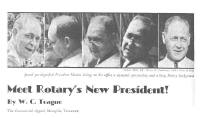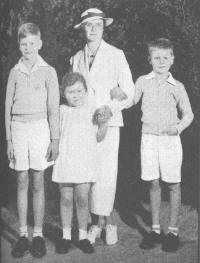|

'To take Rotary
seriously, but, not myself,’
promised Will
Manier, in his acceptance speech.
Here is a sketch of
the man himself.
TRADITION has it
that a North Carolina mountain man was engaged in giving biographical
data in connection with an application for insurance. Under the heading
Father the paper asked, "Born?" He wrote, "Yes." Then it asked, "Died?"
He wrote, "Not yet."
True or false, the
incident is a reliable pointer to the method that will be pursued in
writing this informal personal character sketch of Will R. Manier, Jr.
Statistical details of Bill's career are on record, interesting, and
easily available, but this is just not that type of thing.
Babies obviously
have no control over the matter of which family they are born into, but
it is conceivable that Bill Manier, given the choice, would still have
decided not to interfere at all with what actually happened. If it was a
matter of fate in any sense that he became the child of his parents, it
was a very favorable fate.
The Maniers are and
have been the veritable salt of the earth, with enough pepper and
vinegar added to keep the flavor of the dish nicely balanced. In his
home and from his parents Bill got the heritage of a good name and the
inspiration of association with and guidance from people genuinely
anxious to be right, and equipped to make their effort intelligent and
successful.
There were enough
other young Maniers around, too, so that Bill ran small risk of being
spoiled. The Maniers lived well and thought well. They had good food and
good books. They exemplified the best traditions of Southern
hospitality, and it is worth noting that the children said, "Yes, sir,"
and "Yes, ma'am," when answering Father or Mother.
Bill Manier was
fortunate, too, in that he grew up between the city of Nashville,
Tennessee, and the rural settlement of White Bluff, where the family
rusticated most actively and agreeably in the Summer months. In very
brief, the child received fine training for being the father of the man.
Education, to the
subject of this sketch, is a self- induced and self‑conducted process
and the number of years of it he has had are the same as the number of
years he has lived, but he went actively and rather joyfully through an
adequate term of formal training in an interesting variety of
institutions.
At Wallace School,
in Nashville, under the keen and sympathetic eye of a fine old Roman,
Clarence B. Wallace, Bill took the old‑fashioned classical course:
Latin, Greek , English, mathematics, and history. In his classes he
ranked high when he graduated somewhere near the turn of the Century.
Next there came two
years in Vanderbilt University, then three years at the U. S. Naval
Academy at Annapolis, and finally two years that brought him out of the
Vanderbilt Law School with an LL.B., well won.
TO catalogue the
activities of Bill Manier in school and college and the honors he won
would be to run far over the limitations of space for this entire
article. The picture must be indicated in broad strokes. Let an old
teacher and lifelong friend wield the brush. He writes:
"As a boy in the
Wallace School, he was community- minded. The Wallace School was to him
a social group to the management of which he was loyal and to the
membership of which he tried, with success, to be helpful. He was a
member of the Honor Committee, The strength of the hold of the Honor
System on this school is due in large part to the courageous enforcement
of the Honor System by its early members, such as Manier. Bill
established the school paper and was its first editor. These and other
activities in our little school community gave early evidences of his
wider and larger interests in later life.
The sample is a
valid one and may stand for the whole bolt of school and college as Bill
Manier lived and enlivened them. One who keeps that "community‑minded"
idea in mind will be on the right track.
And now, before
getting out into the field of less statistical matters, if anything can
be less statistical than what has gone before, Bill Manier has practiced
law in NashviIle ethically and successfully, which is rather a neat
trick in itself.
There is a splendid
record of Captain Will R. Manier, Jr., in the files of the War
Department and it has do with service in the World War‑attested by the
distinguished Service Cross. The writer has a notion Bill would honestly
not care for details to be gone into, if he knew this writing was in
progress, and so let us just say no man did his duty more loyally and
efficiently. That says a great deal, a very great deal.
Likewise there is
the fact that Bill Manier is most fortunately and happily married, as
any number of Rotarians who have been in his hospitable, comfortable
home will testify. There are two sturdy boys and a lovely little girl,
and the house is a home under the direction of "Miss Ruth." Bill
Manier's home, though, is a subject on which this particular commentator
always tendency to grow lyrical.
|
Probably no
character sketch can make any just claim to being such without some
mention of a man's hobbies, is found here in the original text with the
subtitle:
 Here are presented
the other members of Will Manier's charming family (left to right):
Jimmie, aged 10, Katherine, 5; Mrs. Ruth Manier; and Bobby, aged 7 and in this instance
the writer is left fearfully embarrassed by riches. Here are presented
the other members of Will Manier's charming family (left to right):
Jimmie, aged 10, Katherine, 5; Mrs. Ruth Manier; and Bobby, aged 7 and in this instance
the writer is left fearfully embarrassed by riches.
It is something like
the analysis an eminent minister once made of Paul. He claimed that
Paul, if he had lived in our day and generation, would have rephrased
his famous statement into, "This one thing I do, these 40 other things I
am deeply interested in and dabble with." At any rate, that sizes up
Bill Manier pretty well. He practices law and he is deeply interested in
at least 40 other worth‑while matters.
Maybe, though,
Bill's outstanding hobby is organizing things, getting them going on a
sound, substantial footing, turning them over to the community in which
he lives, and looking for something else that needs a series of good
setting‑up exercises.
IN that field, we
dare say, Bill is one of the world's finest successive infiltrationists.
He sees a community need. He conceives a sane means of meeting it. He
begins to have conferences with steadily expanding groups. He convinces
two or three and they each convince two or three more. The first thing
anyone knows the machinery for enterprise is built and manned.
That goes for
undertakings as widely different as the building of the fine athletic
stadium of Vanderbilt University and the formation of the Nashville Iris
Society, which is rapidly making Nashville the iris capital of the
world. Bill always reminds this writer of the self‑starter on a motor
car, except that he also can and will pull the load as long as may be
necessary. Anyhow, he is always starting something and making it a
useful part of Nashville's life.
It is not by any
means that Bill lacks perseverance and loyalty, either; but he is
specially gifted in powers of origination and is content to step aside
quietly when the community is ready to take over.
Another of Bill
Manier's hobbies is conversation‑a lost art in many instances, but not
with him. Good talk grows and flourishes in and around Bill Manier, and
he is as willing to listen as he is to talk. One of the things he
organized in Nashville during recent years was a group that specialized
in conversation. It was made up, almost literally, of butcher and baker
and candlestick maker. It had no name, no by‑laws, no constitution, and
no purpose except to get a group of a dozen or so congenial men ‑in
varying lines of endeavor together to swap ideas and gets points of
view. It is typical of Bill's possession of constructive curiosity and
his desire to find out what is right rather than to prove some
preconception.
To be truthful,
though, one ought to say that Bill's one outstanding hobby is or are
butterbeans, which he eats whenever he can get them, and in any
available quantity. A meal at Bill's house that does not include
butterbeans is indeed a reliable sign that there are no butterbeans on
the market.
Talents? Well, Bill
Manier has many, in the informed opinion of this writer,. But his best
one is for friendship and friendliness based on sound reasons. Somebody
said no man was useless while he had a friend, and on that score Bill
must be one of the most useful men anywhere. He has a sort of genius for
human relationships and he exercises it among high and low and in
between.
An odd thing about
Bill Manier, in the writer's opinion, is that he knows how to read in
the best sense of that very exacting word. That is to say, he has a
catholic interest that keeps him aware of the trends of the times and
keeps him abreast of them. A nice sense of humor keeps him balanced, by
the way as does an inveterate dislike of rationalizing. If he should
answer any one of the countless questionnaires professional men receive,
his would come closer than most do in representing what the executor
actually thought rather than what he thought anyone outside would expect
him to think.
And what, someone
may logically ask, of this much written about Bill Manier and no mention
of Rotary? Well, the idea, no matter how ill it has been executed, has
been to show by random example how thoroughly he translates Rotary into
his life in all its phases. But it should be mentioned en passant that
he is a charter member and a former President of the Nashville Rotary
Club, has served as District Governor and on various committees of
Rotary International, and chairmanned the Resolutions Committee which
prepared the now famous Resolution 34 defining Rotary's attitude toward
community cooperation. To tell Rotarians more about Manier and Rotary
would be supererogation.
It is possible that
anyone who has come this far will get the impression that a certain
newspaperman feels a certain lawyer is a rather remarkably fine fellow,
able seaman, and excellent citizen. That being true, the writer enjoys
the sense of pleasure that comes to him who manages by words put on
paper to let others get an accurate notion of what is in his mind and
heart. Written
for the August 1936 issue of The Rotarian by W. C. Teague
of the "Commercial Appeal" Memphis, Tennessee
Prepared by
Wolfgang Ziegler
31 August 2003 |


